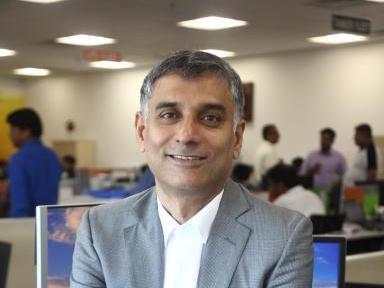Captain Rajesh Unni, CEO and Founder of leading Singapore-based shipmanager Synergy Group, believes technology will unlock the maritime sector’s true potential
The shipping industry must cast off its conservatism and commit to harnessing the operational, financial and environmental benefits new technologies can yield, according to Captain Rajesh Unni, CEO and Founder of Singapore-based Synergy Group, one of the world’s leading shipmanagers.

Captain Unni also serves as CEO Alpha Ori Technologies (AOT), established in 2017 to help the maritime sector address many of these challenges. Critical to AOT’s portfolio is SMARTShip, an Internet of Things (IoT) platform that enables the onboard operation of multiple systems with varying degrees of autonomy.
“AOT has already rolled out 30 SMARTShips and has another 60 in the pipeline at various stages of the set-up process,” said Captain Unni.
He believes most shipping companies are risk averse and, as a result, are failing to benefit from the commercial and operational gains now possible through the integration of new technologies, both on ships and ashore.
“Technology is already redefining our industry,” he said. “IoT, Machine Learning and Cloud-based Big Data science are revolutionising shipping and shipmanagement processes. They can yield efficiency and transparency for owners, ship suppliers and operators.
“Shipboard and shoreside operations can be made more efficient and cost-effective by bringing in customized technology to cater to the specific needs of our industry.
“But digitalisation is a constantly changing landscape. To be effective and future-proofed, shipping companies need to understand the demands of the modern, digital world and the absolutely transformative nature of technology.”
AOT takes a holistic approach to solving maritime pain-points. Data is collected from all parts of the ship to create a platform which connects all the disparate systems to allow the technology to continually monitor data and help crew and managers make rules-based decisions.
“SMARTShip uses cutting edge technologies to solve real-world issues for every stakeholder in the logistics value chain - Ship Owners, Ship Managers, Ship Operators, Port Management, Surveyors, Ship Registries, P&I Clubs, Shipbuilders and others,” said Captain Unni.
“We view the ship as a Digital Enterprise. To fully yield the benefits and transparency these technologies offer, we view our mission as to digitally connect the entire ecosystem within the ship. We can plug this ship into a digital cloud that connects to many other ships, and create the system, tools and business processes that are needed to activate remote monitoring and control of these digitally connected ships, while using collected data as a strategic weapon to drive economic value.
“This produces clear, tangible financial and environmental gains in the shape of fuel and predictive maintenance savings, and enhanced asset utilization. There is a real return on the investment.”
AOT is already making waves in the field of automation. Trammo Dietlin, a Singapore-registered vessel in the Global United Gas Carriers fleet, recently became the first ship in the world to be awarded Lloyd’s Register’s cyber AL-SAFE [‘autonomous level safe’] notation which certifies the safety of onboard autonomous systems.
The vessel was constructed by Hanjin Heavy Industries in collaboration with AOT, which supplied its patented SMARTShip autonomous control system. “Trammo Dietlin demonstrates the digital transformation of shipping,” said Captain Unni.
AOT also recently established an AOT ‘Center of Innovation’ in Singapore which operates a Network Operating Centre to remotely monitor and control digitally-enabled ships and is now working on a range of additional products which will be rolled out as the year progresses.
Captain Unni believes the challenge facing AOT and the shipping sector is one of innovation implementation.
“You need innovation in both products and processes to fully digitise,” he explained. “They are not mutually exclusive. You need one to enable the other.
“Take Amazon, for example. They have changed the way the retail industry operates by introducing virtual showrooms, 3rd party supplier platforms, offering online ordering and fulfilment to any business, Data Cloud sourcing as a business model etc.
“However, none of that would have been possible unless Amazon developed the basic infrastructure of E-commerce and fulfilment to serve its retail business. It enabled Amazon to create a sustainable business and, at the same time, slowly mature the digital platforms to a level where new lines of services could be offered to the industry.
“I see the shipping industry moving in a similar way whereby we innovate products and services for digitalisation, while keeping the return on investment in mind so we have a sustainable business model. As the products and services mature it will enable new ways of managing and operating ships. This is what motivates us at Alpha Ori Technologies and Synergy.”

_-_127500_-_adebdcc0e07d3faa22ffd6c1efa37fb9ec5e645a_yes.png)



_-_127500_-_67e742b77128f6e9c66025d21e7d0479374d8875_lqip.png)


